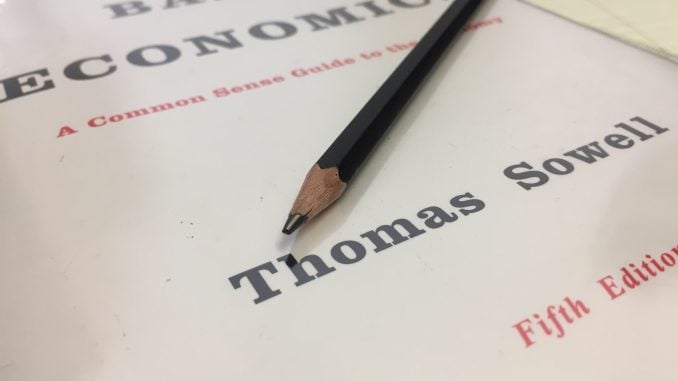
Gastonia native Thomas Sowell must feel like he has achieved the transcendental wish of Garrison Keillor. So many Americans are praising Sowell that radio personality Keillor’s observation seems to have come true: “They say such nice things about people at their funerals that it makes me sad to realize that I’m going to miss mine by just a few days.” Sowell, 86, has not died. He merely retired his column that he has been writing for decades. The praise is well deserved for the brilliant economist and author. Fellow economist Mark Hendrickson wrote this week in his Sowell obituary oops, tribute that Sowell “fearlessly goes wherever facts, data, and experience lead him.” His clear, earnest prose is a medium for leading the willing to see things through a factual not emotional or political lens. “What is more frightening than any particular policy or ideology,” Sowell wrote, “is the widespread habit of disregarding facts.” Here Sowell spoke of one of the main themes of his career and his most lasting contribution to public policy arguments his insistence that effects matter more than intentions. Sowell is a great American success story. After leaving North Carolina, Sowell’s family settled in New York, where he dropped out of school money was tight to work in a factory after 10th grade, served in the Marine Corps in Korea, then attended Howard University on the G.I. Bill. Sowell, columnist Walter Williams, and other black conservatives have been insulated from (but not completely shielded from) the outrage-industrial complex of the left. The insulation has allowed them to probe policy questions in ways that would get others fired. Not many conservative columnists, for instance, could write the following: “It might never occur to many (on the left) to check their beliefs against some hard facts about what actually happened after their ideas and policies were put into effect. It certainly would not be pleasant to admit, even to yourself, that after promising progress toward ‘social justice,’ what you actually delivered was a retrogression toward barbarism. “The principal victims of these retrogressions are the decent, law-abiding members of black communities across the country who are prey to hoodlums and criminals.” Sowell’s campaign for policies that are effective, rather than merely aspirational, has been strikingly influential. It is no coincidence that part of this editorial board’s stated philosophy is to”value results over intentions.” Sowell has also been influential for his fellow black conservatives. The Wall Street Journal’s Jason L. Riley wrote Jan. 4 that “anyone interested in differentiating between the needs of the black underclass and the needs of the NAACP will sorely miss (Sowell).” Columnist Stacy Washington said Sowell’s “ideas and concepts… influenced and refined my thoughts on so many issues.” Closer to home, there is U.S. Sen. Tim Scott from South Carolina. Scott who, like Sowell, escaped poverty credits Sowell, among other conservative thinkers, with informing his views on big government in general and the welfare state in particular. Scott is now the only African-American ever elected to full terms in the House and the Senate by any party, from any region. That kind of historical change is frightening for some. Thus, the North Carolina NAACP’s William Barber called Scott a “ventriloquist’s dummy.” Scott dismissed the attack, but added that Barber “will remind me and others of what not to do.” The truth is that ideology now matters more than race in South Carolina. (Read that last sentence again, very slowly.) Sadly, ideology matters more than race in popular culture as well, in the sense that many self-proclaimed diversity champions don’t really care about racial diversity they care about electing liberals. Or, at least, they care about electing liberals more than they care about racial diversity. Sowell has said that, since the 1950s, well-meaning liberal policies are the worst thing to happen to low-income Americans. Then he provided ample evidence, easily understood, to back up his claim. In closing, many thanks and congratulations from the Land of the Longleaf Pine to Dr. Thomas Sowell. May he enjoy a long and happy retirement, secure in the knowledge that he will not outlive his ideas and influence even if he lives another 86 years. Drew Elliot is a member of the North State Journal’s editorial board, separate from the news staff. Unlike other newspapers, the North State Journal does not publish unsigned editorials; the author or authors of every editorial, letter, op-ed, and column is prominently displayed. To submit a letter or op-ed, see our submission guidelines.



